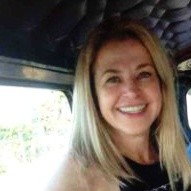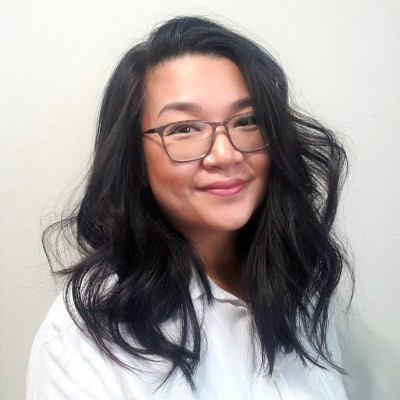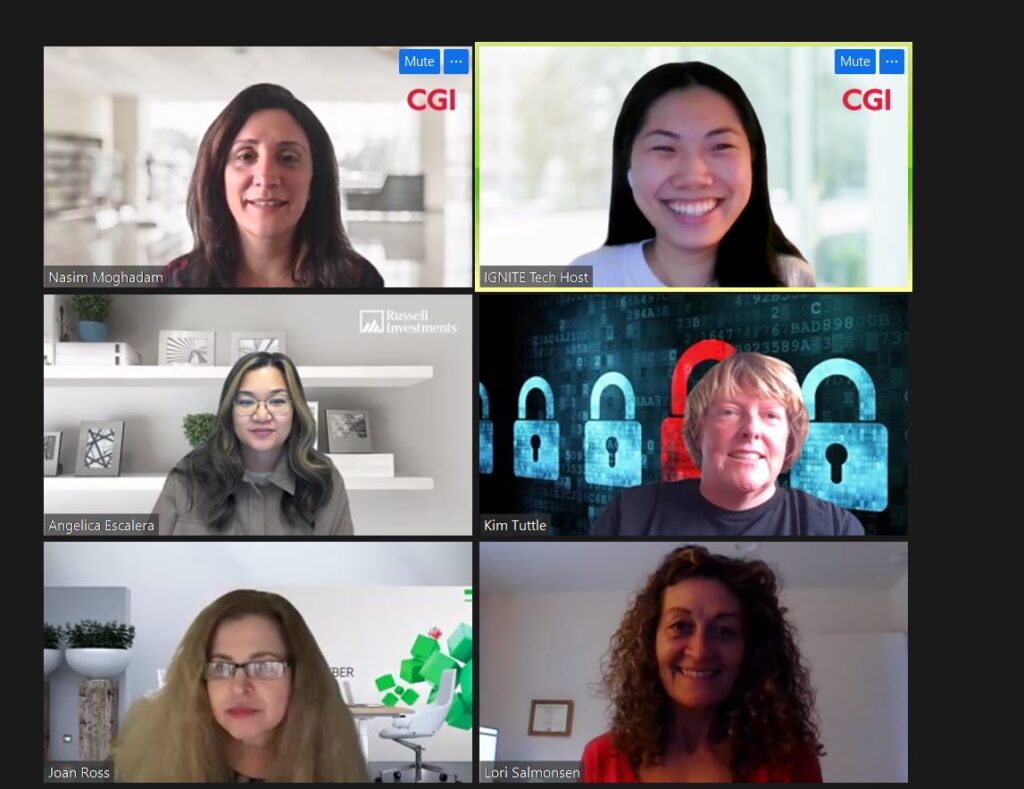On March 3, 2022, IGNITE students at West Valley Innovation Center in Washington attended a Virtual Cybersecurity Workshop with volunteers from CGI, Russell Investments, and InsightCyber. The panelists included esteemed senior cybersecurity professionals who shared their experiences, stories, advice, and thoughtful answers to the students’ questions.
The event kicked off with a helpful introduction to STEM by Facilitator Nasim Moghadam, who does development work for the global company, CGI. The STEM program mission is to introduce, inspire and mentor students to help increase diversity in the IT industry. STEM is fun, pays well, innovative, has job stability, and is fulfilling. It is needed in many industries including fashion and movies. These industries and many others want to hire more women and nonbinary people. There are more STEM jobs than people to fill them, and it’s a great opportunity for future female leaders.
Next, Nasim asked the students what percentage of professionals in cybersecurity they believe are women. The correct answer is only 20%!
After the facilitator’s introduction and poll, each panelist shared their personal story.

Kim Tuttle, Director of Cybersecurity at Russell Investments, began in the mail room and attended school at the same time. She completed her degree and was interested in math, although she was not a great student because she found her experience boring and unchallenging. Russell Investments was a good opportunity for her, and she’s been there for a long time. She talked to computer folks at Russell and thought it was exciting. She wanted to get into IT to help people with passwords and troubleshooting, and found this problem-solving interesting. Russell started up a security department years ago, and she now runs the cybersecurity team there. For the past 8 years, she has held the distinction of being the best female lock picker in the world!

Joan Ross, Chief Intelligence Officer at InsightCyber, first met Kim 23 years ago, when they took a six-hour security exam together. Joan grew up in Seattle and read a lot as a child. She worked hard and went to school full time. She worked at her first job with computers and found out she was both left- and right-brained. She is currently working on her doctorate degree in AI (Artificial Intelligence).

Angelica Escalera, Associate Director, Workplace Technology at Russell Investments immigrated to the US from the Philippines. She has been working in IT for ten years, and her team focuses on critical technologies that run the business day to day, such as chat and hardware. She took computer-aided drafting in high school and really enjoyed making models. She was drawn to technology and went to school for architectural drafting and then pivoted later to get an entry-level IT support role. Ten years later, she is working at Russell.
After the introductions, the students had a chance to ask their own questions. Here’s a sampling of their questions along with summaries of the panelists’ answers.
Are there issues for women such as sexism and judgment?
As a woman in STEM careers, it’s still very limited. You have to make a place for yourself even if there’s not a place already there. People will judge you for being a mom or a woman. You have to work hard and find somewhere to make a difference.
Stand your ground and don’t be intimidated by others, and do your job to the best of your ability anyway.
Joan shared: “It was a double whammy because I was very young and female when I first started. At the very young age of 18 I decided I was going to be better than everyone else. There was a bootcamp that cost ten thousand dollars for training, and the guys were able to do that. I had to do it on my own though by reading books and taking the exam, and I passed. I knew I would have to work harder than the boys and I did it.”
Were there times when you doubted yourself and just wanted to quit STEM?
Yes, unfortunately. To grow and develop you have to be open to other opportunities and companies, and willing to leave your job if you don’t feel supported, think you are underpaid, and see more opportunities for growth elsewhere. Some panelists have had to leave previous jobs to find the right fit.
All of us have an internal voice, and many women in cybersecurity have imposter syndrome. People want you to doubt yourself, so you will give up. The movie Hidden Figures portrays how women used to be the best mathematicians, engineers, and scientists. Then the guys found out what good jobs those were and they crowded the women out.
Kim shared that, when she had to give a presentation to a bigwig, “I gave an update and was sweating and my voice was cracking. I was so nervous. I reached out to people in the meeting room and asked for suggestions for improvement. I got an executive coach to improve my public speaking and communication. My executive coach told me to tell myself before walking into the meeting, ‘you are the smartest person in that room on cybersecurity.’ If your job is hard though and not fulfilling, then have a hobby that you love such as travel and lock picking.”
Do you have any other recommendations?
High school is the best place to experiment with whatever interests you—and it’s free. Expose yourself to as many different elections and options as you can. Then later you can narrow it down to figure out what to do after high school.
Figure out your interests as there are lots of components of IT, and the fields that the panelists work in were, in some cases, not even around when they were in high school themselves.
Can Kim show us a lock picking trick?
Kim learned how to lock pick out of desperation. A leader at her company dropped her phone in a bin and Kim used paper clips to pick the lock and get it out. She also practices before going to conferences. She recommends that anyone interested in learning get a practice lock, which is clear so you can see what you’re doing. But remember—it is illegal to pick locks without permission.

In the next portion of the workshop, Joan introduced a true story about ransomware: Imagine you’re on your way to school, and something is wrong with the teacher. Not talking to students or you’re in the Zoom waiting room way too long. Your parents are receiving notices that the systems are down. This actually happened at the sixth largest public school district in Florida. It was a ransomware attack, which is when cryptography (typically used to protect data) was used against people to access their data. Hackers were demanding a bribe of $40 million of ransom to unlock and restore the system. The hackers said they wanted it in bitcoin. The school said they didn’t have that much money and couldn’t pay. 26,000 files (admins, teachers, students, personal info) went out over the internet. This happened exactly one year ago.
The students then broke into smaller groups with a panelist. They discussed and shared their questions and experiences around cybersecurity. Here are a few highlights.
- What is some digital info you have that someone might want to steal? Online birth files, profiles, passwords, accounts, or medical information.
- Do you change your passwords? How often? Passwords need to be long and not a keyword. Use a lyric from a song with added caps or other characters. Do not use things such as your birth date, mother’s maiden name, or the city you live in.
- The reason you don’t want digital info stolen is called ID theft. Do you know anyone who has it stolen online? It means someone pretends to be you. What’s the big deal? It is not just catfishing. It hurts people because they open up credit cards in your name. Then you have to pay it back, or it ruins your credit and you can’t buy a house or car. They can make it so you can’t get a passport to travel to other countries because they used your name to travel and then commited crimes. They get a job in your name and then do not pay taxes.
- Be aware of phishing emails. When you get an email, check the addresses and links by hovering over them before clicking. Be cautious with photos in email. Attachments often contain malware (malicious software). Don’t ever follow links in emails that say to change your password.
Lightning Round! What final advice do panelists have for the students?
- Kim: Make your comfort zone outside your comfort zone. Always be moving forward. Find someone who believes in you. I’m still in touch with someone who believed in me more than I believed in myself.
- Joan: Everybody wants to learn from somebody, and people will listen to and remember you. You know more than you know.
- Angelica: Regardless of when you start, it’s never too late. Don’t be afraid to fail because with every failure comes a lesson learned.
Thank you to CGI, Russell Investments, and InsightCyber volunteers Kim Tuttle, Nasim Moghadam, Joan Ross, Angelica Escalera, and Yeng Lan Kwok, who was the Tech Host for this event, along with IGNITE Volunteers Lori Salmonsen and Kristin Mullinax, for participating in this IGNITE panel and helping to increase gender diversity in STEM career pathways.
After attending this event:
Here’s what the students thought of the event:
“It was nice to look at how to identify whether emails were phishing or not. It was also nice to see so many women here today sharing their stories.” – 7th grade
“Today inspired me to become an engineer even more than before.” – 8th grade
“From now on I know I’ll be more aware of scams and better cybersecurity.” – 8th grade
“They taught me how to spot a scam and the red flags to look for. I learned signs that I didn’t even know or think about. I now know more about how to be safer and what to look out for.” – 8th grade
“It inspired me to get out of my comfort zone and try new things and never give up.” – 7th grade
“It inspired me to look at clubs that correlate to the STEM field.” – 8th grade
“It inspired me to go into a STEM career.” – 7th grade
“I enjoyed the stories from the panelists.” – 9th grade